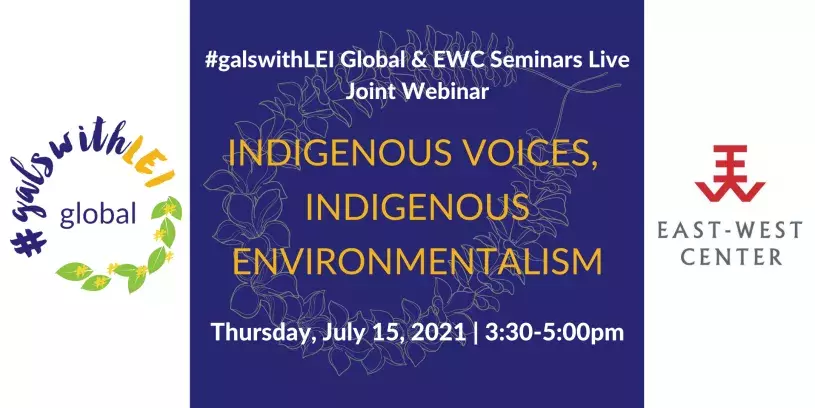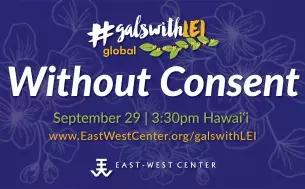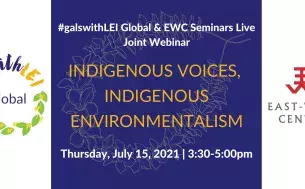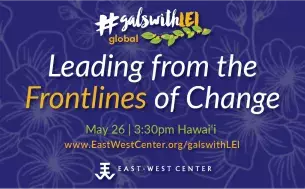Error message

OFFICE/DEPARTMENT
Jointly presented by EWC Seminars Live and #GalswithLEI Global.
Indigenous peoples, who comprise just 5% of the world’s population, contribute significantly to the world’s environmental diversity as more than 80 % of the world’s remaining biodiversity are found within their lands. As such, climate change poses a dire and immediate threat to the survival of Indigenous people worldwide, due to their dependence upon and close relationship with the environment and its resources. Preservation of the environment, transmitted as traditions of generational stewardship, is at the center of their existence, identity and culture.
With traditional ceremonial practices rooted in the interconnectedness of the environment and people, Indigenous environmentalism offers perspectives on climate issues that underscore social and economic equity. The newest Intergovernmental Panel on Climate Change (IPCC) report, in fact, states that there is “high agreement that Indigenous knowledge is critical for adaptation.” Within Indigenous communities worldwide, women have been and continue to be at the forefront of grassroots movements to secure land and territorial rights and equitable representation globally. Indigenous women have successfully defended their lands, territories and natural resources from private and government interests through advocacy and concerted, collective action, while developing coping strategies and mechanisms to minimize the impact of climate change. Indigenous women are, thus, critical allies in climate change adaptation and mitigation.
Join Indigenous women leaders, environmentalists and activists representing Native American, Filipino, Indonesian Dayak and Native Hawaiian communities in giving voice to the importance and value of adaptive practices and processes, sustainable management and use of natural resources, and collaborative efforts across Indigenous communities globally in addressing environmental degradation and climate change.
Keynote
- Heidi TODACHEENE, Senior Advisor, Office of the Assistant Secretary for Indian Affairs, U.S. Department of Interior, Washington, DC, USA
Panelists
- Dina GILIO-WHITAKER, Author, As Long as Grass Grows: The Indigenous Fight for Environmental Justice, from Colonization to Standing Rock and Lecturer, American Indian Studies, California State University San Marcos, San Clemente, California, USA @DinaGWhit
- Joan CARLING, Co-convener, Indigenous Peoples Major Group for Sustainable Development, Baguio City, Philippines @JoanCarling
- Emmanuela SHINTA, Filmmaker, When Women Fight & KAHARAPEN and Founder & Director, Ranu Welum Foundation, Kalimantan, Indonesia @EmmanuelaShin
- Ulalia WOODSIDE, Executive Director, The Nature Conservancy of Hawaiʻi and Palmyra, Honolulu, Hawaiʻi, USA @UlaliaWoodside
Moderator
- Stephine POSTON, Owner & Chief Executive Officer, Poston& Associates LLC and Changing Faces Seminar Alum, Sandia Pueblo, New Mexico, USA @SandiaPoston
Click here for headshots and biographies.
Jointly presented by EWC Seminars Live and #GalswithLEI Global.
Indigenous peoples, who comprise just 5% of the world’s population, contribute significantly to the world’s environmental diversity as more than 80 % of the world’s remaining biodiversity are found within their lands. As such, climate change poses a dire and immediate threat to the survival of Indigenous people worldwide, due to their dependence upon and close relationship with the environment and its resources. Preservation of the environment, transmitted as traditions of generational stewardship, is at the center of their existence, identity and culture.
With traditional ceremonial practices rooted in the interconnectedness of the environment and people, Indigenous environmentalism offers perspectives on climate issues that underscore social and economic equity. The newest Intergovernmental Panel on Climate Change (IPCC) report, in fact, states that there is “high agreement that Indigenous knowledge is critical for adaptation.” Within Indigenous communities worldwide, women have been and continue to be at the forefront of grassroots movements to secure land and territorial rights and equitable representation globally. Indigenous women have successfully defended their lands, territories and natural resources from private and government interests through advocacy and concerted, collective action, while developing coping strategies and mechanisms to minimize the impact of climate change. Indigenous women are, thus, critical allies in climate change adaptation and mitigation.
Join Indigenous women leaders, environmentalists and activists representing Native American, Filipino, Indonesian Dayak and Native Hawaiian communities in giving voice to the importance and value of adaptive practices and processes, sustainable management and use of natural resources, and collaborative efforts across Indigenous communities globally in addressing environmental degradation and climate change.
Keynote
- Heidi TODACHEENE, Senior Advisor, Office of the Assistant Secretary for Indian Affairs, U.S. Department of Interior, Washington, DC, USA
Panelists
- Dina GILIO-WHITAKER, Author, As Long as Grass Grows: The Indigenous Fight for Environmental Justice, from Colonization to Standing Rock and Lecturer, American Indian Studies, California State University San Marcos, San Clemente, California, USA @DinaGWhit
- Joan CARLING, Co-convener, Indigenous Peoples Major Group for Sustainable Development, Baguio City, Philippines @JoanCarling
- Emmanuela SHINTA, Filmmaker, When Women Fight & KAHARAPEN and Founder & Director, Ranu Welum Foundation, Kalimantan, Indonesia @EmmanuelaShin
- Ulalia WOODSIDE, Executive Director, The Nature Conservancy of Hawaiʻi and Palmyra, Honolulu, Hawaiʻi, USA @UlaliaWoodside
Moderator
- Stephine POSTON, Owner & Chief Executive Officer, Poston& Associates LLC and Changing Faces Seminar Alum, Sandia Pueblo, New Mexico, USA @SandiaPoston











